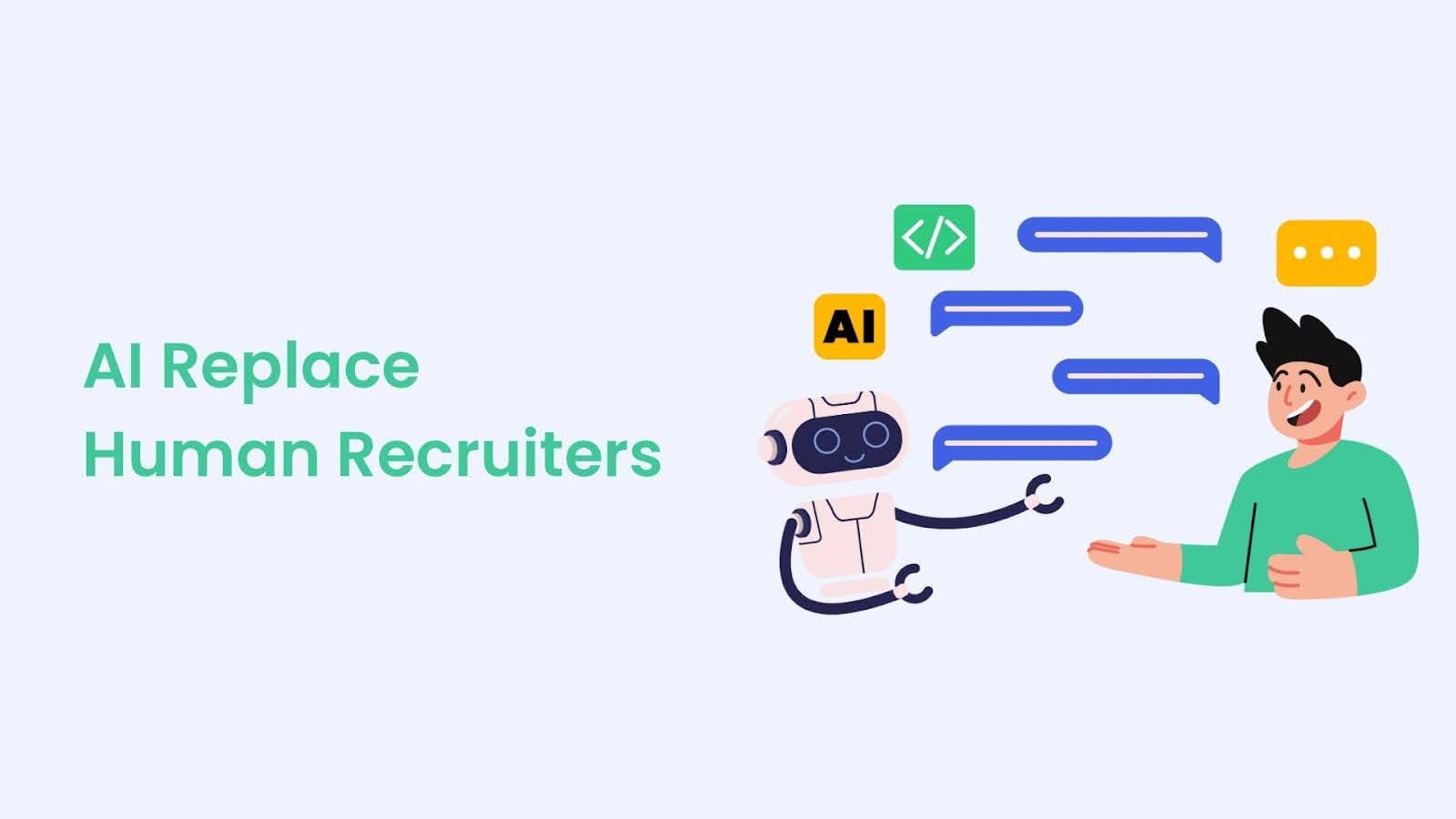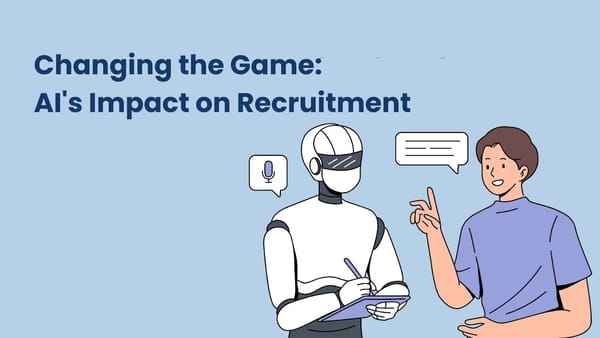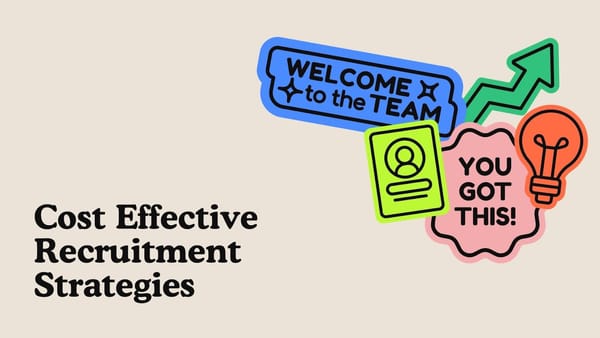AI is reducing the time to hire and personalizing recruitment. This massive improvement raises a few questions. You’ve seen it everywhere—articles, headlines, and conversations all asking the same question: Will AI take my job?
It’s a concern that doesn’t seem to be going away. In fact, throughout 2024, interest in this question spiked several times, with search data showing an average interest rate of 24% across the year.
AI can filter resumes, schedule interviews, and sort through mountains of data in seconds. But here’s the real question: Can it do what you do? Can it replace the human touch in recruitment — the judgment, the relationships, the instincts?
In this blog, we’ll tackle the heart of this debate. Is AI coming for your job, or is it just here to make your life easier? Let’s find out.
Role of AI in Recruitment
AI has made its way into recruitment faster than many expected. From sourcing candidates to managing administrative tasks, AI tools are being used to speed up the hiring process. If you’ve used AI-powered tools, you know how much time they can save. Companies are using AI tools to automate recruitment tasks like resume sorting, candidate outreach, and interview scheduling. Advancements in AI, like large language models, have made communication more natural and efficient.
The impact is clear: AI is doing a lot of the legwork. But this is just the beginning. The next step is to look at what AI is currently capable of handling in recruitment.
Current AI Capabilities in Recruitment
AI has proven its worth in handling several repetitive tasks in recruitment. These capabilities are designed to save time and help you focus on what truly matters—building connections and making strategic decisions.
- Automated Resume Screening: AI can now scan thousands of resumes in a fraction of the time it would take you. It identifies key qualifications, skills, and experiences that match the job description, cutting out the need for manual sorting.
- Chatbots and Virtual Assistants: These AI-powered assistants engage with candidates from the start, answering questions, providing job details, and even scheduling interviews. They help maintain consistent communication with potential hires, even outside working hours.
- Predictive Analytics: AI can analyze historical hiring data to predict which candidates are most likely to succeed in a given role. This data-driven approach gives you more confidence in your decisions by highlighting patterns that aren't always visible at first glance.
- Automated Interview Scheduling: AI coordinates schedules between candidates and hiring managers, eliminating back-and-forth emails and saving everyone time.
In a Linkedin post, Lee Harding, a talent acquisition leader, shares valuable insights:
"I love AI, I use it every single day. It makes me more efficient, it makes me better at my job, but is it coming to take my job completely? In a word, no."
He explains further, "AI can already filter CVs, source candidates, message candidates, provide shortlists, book interviews, provide feedback, answer candidate and hiring manager questions, it can basically do a large chunk of what a recruiter does each day."
While AI can handle these tasks with ease, the human element remains crucial. Let’s explore what human recruiters bring to the table that AI can’t replicate.
Human Recruiters: The Irreplaceable Element
AI can handle tasks at lightning speed, but it can’t replace the human touch. Recruitment is primarily about understanding people, motivations, and culture fit. That’s where you come in.
- Empathy and Judgment: While AI can sort resumes, it can’t pick up on the subtleties of a candidate’s personality or how they might fit within a team. You bring emotional intelligence and insight that no algorithm can replicate.
- Building Relationships: Recruitment is built on trust and relationships. Candidates often make career decisions based on personal connections with recruiters who understand their goals. This level of rapport is something only a human can provide.
- Complex Decision-Making: Salary negotiations, role expectations, and cultural alignment require human intuition and judgment. These are complex decisions that go beyond algorithms. You can navigate sensitive conversations and make adjustments that lead to better hires.
That said, combining AI with human expertise creates a powerful team. Tools like Tidyhire demonstrate how you can leverage AI to handle repetitive tasks while you focus on building relationships and making key decisions.
In the next section we will explore how with AI handling the background work, you can lead the way with your unique insight and empathy. Below is a table with a quick comparison between the two.
AI and Human Collaboration in Recruitment
AI is not a replacement for human recruiters. It’s a tool that enhances the hiring process by taking over repetitive tasks and freeing up your time.
- Enhancing Productivity: AI tools handle time-consuming tasks like resume scanning and follow-ups, which lets you focus on the strategic parts of recruitment. With Tidyhire’s RIA, you save valuable time during candidate sourcing, so you can prioritize the human side of the process.
- Reducing Bias with Human Oversight: While AI processes data without bias, your role is to oversee the final decisions, ensuring they align with company values and fairness.
- Efficiency Meets Personalization: AI improves speed and accuracy, but your expertise ensures candidates get a personalized experience. Tidyhire helps streamline the background work, leaving you more space to build meaningful connections with candidates.
Collaboration between AI and recruiters is shaping the evolution of the recruitment process. Now, let’s look at how AI might continue to impact the future of recruitment.
Future of AI in Recruitment
AI will continue advancing, making recruitment even faster and more streamlined. Its role will still revolve around supporting recruiters in key areas rather than replacing them.
- Hyper-Personalized Candidate Experiences: AI will likely offer deeper personalization by analyzing individual career paths and suggesting roles based on unique skills and interests. Tools like Tidyhire can help automate this level of customization, ensuring candidates feel valued and targeted for the right roles.
- Predictive Workforce Planning: AI tools will help recruiters stay ahead by predicting hiring needs before positions open up. Tidyhire’s RIA could assist in proactively sourcing candidates, ensuring you have a talent pipeline ready for future needs.
- Handling High-Volume Recruitment: For companies needing to hire in bulk, AI will remain essential. It will sift through large pools of candidates efficiently, leaving you to focus on evaluating the best fits. Tidyhire simplifies this process by handling the sourcing and outreach, freeing up your time for more important decisions.
Looking forward, AI is set to enhance how recruiters operate rather than take over completely. The future of recruitment will rely on a balanced partnership between AI and human skills.
Let’s now explore what the future holds for human recruiters in this AI-powered landscape.
Future of Recruiters
As AI takes on more of the administrative tasks in recruitment, your role will shift toward areas where human expertise is irreplaceable. The future will be less about managing processes and more about focusing on strategy, relationships, and emotional intelligence.
- AI Specialization: Recruiters will need to become more proficient with AI tools. Being able to work with platforms like Tidyhire will be crucial, as these tools handle everything from sourcing candidates to automating follow-ups. Your expertise will shift toward managing these systems and making the final, nuanced decisions that AI can’t handle.
- Relationship Management: Building deep, meaningful connections with candidates will be more important than ever. While AI speeds up the process, it’s the recruiter’s personal touch that will guide candidates through the final stages of their career decisions.
The future of recruitment will be a blend of AI efficiency and human connection, and it’s the recruiters who adapt to this balance that will thrive.
Conclusion
AI is transforming recruitment by taking on many time-consuming tasks, but it isn’t replacing the recruiter. Instead, it complements your role, allowing you to focus on what you do best—building relationships and making key decisions.
The future of recruitment lies in a partnership between human insight and AI efficiency. Tools like Tidyhire demonstrate this balance by automating tasks like sourcing, follow-ups, and outreach while giving you the space to bring empathy and strategy into the process.
By embracing AI, you’ll not only stay ahead of the curve but also provide a more personalized, efficient experience for candidates. In this evolving landscape, those who can seamlessly combine technology with the human touch will lead the way.
Ready to enhance your recruitment process with the speed of AI and the empathy of humans? Book a call with Tidyhire today and see how our Recruiting Intelligence Agent can transform your hiring strategy.



